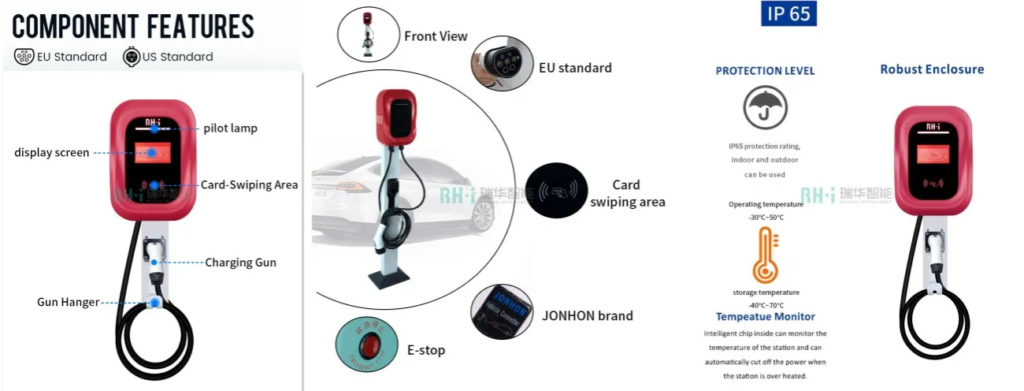24 amp eV charger vS 30 amp: Which one suits you?
When choosing an EV charging solution, current specification is an important factor in charging speed, safety, and cost-effectiveness.24 amp and 30 amp EV chargers, two common choices on the market, each offer advantages.
Both 30 amp and 24 amp EV chargers are classified as Level 2 chargers, which utilize a 240 volt outlet and offer faster charging speeds than Level 1 chargers. Level 2 EV chargers are recognized as a popular choice for home charging of electric vehicles, striking a balance between power and efficiency for safe EV charging.

Charging speed
30 Amp EV Charger: The 30 Amp EV charger delivers a maximum of 7.2kW at 240V. For electric cars with larger batteries can be charged 30 miles per hour in a short period of time providing more range than 24 amp.
24 Amp EV Charger: The 24 amp charger provides 5.76kW of charging power for approximately 25 miles per hour, especially in commercial environments with smoother charging needs, such as office buildings and retail stores. Ideal for electric vehicles for daily urban commuting.
Installation Requirements and Costs
30 Amp EV Charger:
- Installation Requirements: 30 amp chargers typically require a higher electrical configuration due to their higher power. The installation process may require modifications to the existing electrical system, especially in areas with inadequate power supply. As a result, the installation process may involve higher electrical modification costs and time costs.
- Cost Effectiveness: While the equipment itself may be slightly more expensive, for commercial charging stations, a 30 amp charger is able to serve more users in a shorter period of time, thereby increasing the operational efficiency and revenue of the charging station.
24 Amp EV Charger:
- installation respect: 24 amp chargers have relatively low power requirements and are suitable for most standard electrical systems. Relatively simple to install and low retrofit costs, suitable for sites with limited budgets or where the electrical system is already more than adequate.
- Cost Effectiveness: Although slower to charge, 24 amp chargers can provide a more economical solution in some scenarios where charging needs are lower, suitable for commercial locations with non-high frequency charging.

Compatibility and application scenarios
30 amp EV charger
Suitable for a wide range of electric vehicles, especially those requiring larger battery capacity. Including Tesla, Chevrolet Bolt, etc., all are compatible with the 30 amp EV charger. It is suitable for high-frequency commercial charging locations, as well as electric bus charging stations and other locations. Its charging speed can effectively improve the operational efficiency of commercial charging stations and reduce customer waiting time.
24 Amp EV Charger:
The 24 amp charger is also suitable for most electric vehicles on the market, especially for daily commuting. Ideal for small commercial locations such as office buildings, hotels, retail stores, etc. For these locations, where users’ charging needs are relatively low, the 24 Amp charger is able to meet basic charging needs while reducing operating costs.
Business Management and Operations
30 Amp EV Charger:
30 Amp chargers can support high frequency charging and improve the operational efficiency of charging stations. For commercial locations with a high number of EVs, 30 Amp chargers are able to quickly charge more vehicles, thereby increasing the amount of charging per unit of time.
Despite the higher initial investment, 30 Amp chargers can provide higher charging speeds and frequency of service, which typically results in a quicker return on investment for commercial charging stations in high-demand areas.
24 Amp EV Charger:
For commercial locations with low loads, 24 Amp chargers can provide charging at a lower operating cost and are suitable for those locations where charging frequency is low and user demand is smooth.
Although 24 Amp chargers provide slower charging speeds, they are effective in reducing initial investment and operating costs for environments with relatively low charging demand, making them suitable for long-term operation.
at last
Choosing between 24 Amp and 30 Amp EV chargers depends on charging needs and operational priorities. The 30 Amp charger, with its higher charging capacity of 7.2kW, is ideal for high-demand environments such as commercial charging stations or areas requiring rapid charging. It supports faster charging but comes with higher installation and equipment costs.
In contrast, the 24 Amp charger offers 5.76kW of power, making it a cost-effective option for locations with moderate charging needs, such as offices or retail spaces. It is easier to install and suitable for businesses seeking a balance between affordability and functionality, particularly for steady, low-frequency charging scenarios.
